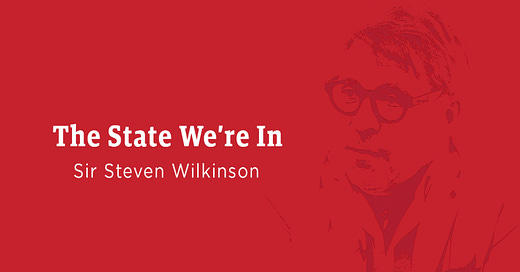Sir Wilkinson on Artificial Intelligence
We’re apparently vacillating between measured optimism and collective worry these days (let us know if you disagree). There’s a widespread feeling circulating throughout the West that, just as a re-calibration of our sociopolitical bearings is underway, even larger forces are at work around us, the sort that can lead to a reckoning not merely for political orders and class structures, but for wider civilizations.
It’s as though the baseline realm of politics, foreign policy, markets, and labor are operating by one set of (possibly obsolete) rules, while in a dominion parallel to – and encroaching upon – our own, there are machinations at play designed to completely overwhelm the aforementioned baseline items.
At the center of these misgivings is, of course, the strangely persistent but only intermittently consequential rise of Artificial Intelligence. Yes, there are also the “turning” forces of history about which Neil Howe, Bill Strauss, and others warn (more on those in the guest piece below), and they are sure to be felt by humanity in the coming years. But there might be other reasons we can’t seem to shake the sense that something seismic is just around the bend. The ensuing question won’t be ignored: Will we be ready?
For heavy truths, challenging premises, and profound insight, we will soon turn to the words of Sir Steven Wilkinson, a well-known intellectual to whom we are loosely (and humbly) connected via mutual friendship with the eminent Grant Williams, a superlative intellect in his own right.
Grant recently coordinated the minds of various leading philosophers and academics into a sort of think-tank edition of his always fantastic (but especially so this month) Things That Make You Go Hmmm… newsletter. The topics covered therein were necessarily diverse on account of the vastness of the Western World’s current geopolitical stewings. As Grant put it in his preface:
The brief I gave them was as broad as it was simple: please share your thoughts about the world around us, from whichever perspective animates you the most. No length restrictions, no subject restrictions.
Nothing.
I was intrigued to see the various angles taken by these five extremely thoughtful gentlemen, and as you’ll see as you make your way through the pages that follow, they each delivered an incredibly thought-provoking meditation.
As you have likely deduced, Sir Wilkinson was among those five to contribute a serving of wisdom to this TTMYGH coalescence. His piece on the social, economic, and fundamentally human implications of Artificial Intelligence drills into some rough terrain in search of a fount of understanding, some measure of comprehension about a world we might soon find rather unfamiliar as Stephen Covey’s famous maxim comes into play: “Remember, technology is a great servant, but a terrible master.”
Both Grant, in his preface, and Sir Wilkinson, in the essay excerpted below, allude heavily to the aforementioned Fourth Turning, as the pattern that work seeks to define is now seemingly witnessing many of its features come into relief. There is little doubt among this cohort that a revolution is underway; all that remains to be realized – possibly only in hindsight – is the form(s) it will take and what sort of First Turning it will lead us to.
In the interest of a more expeditious read, we have abbreviated Sir Wilkinson’s essay (believe it or not!) while elevating what we found to be the most salient and fascinating points therein. While we concede that it is still lengthy, we feel this subject is critically important, particularly his discussion of what AI could do to the vital U.S. services sector.
Enjoy!
The Haymaker Team
P.S. Please note that we will be resuming our monthly Webinar series in April, following a major announcement pertaining to the Haymaker’s world. Thank you for your patience and continued support of all things Haymaker!
The piece below was originally published in its full form in Grant Williams’ Things That Make You Go Hmmm… (February 2025 edition)
Civilizations begin to disintegrate when enough people start to gain status through unproductive and destructive behaviour that they impose unsustainable costs upon it.
—Baruch Hashofer How Things Collapse, Postkahanism Substack
Disruptive Technology
Early exposure to technological disruption—whether positive or negative—often shapes entrepreneurs’ later approach to innovation and business management. A powerful example of this is Andrew Carnegie’s family experience in Edinburgh, Scotland in the first half of the 19th Century, where his father was one of many private hand-loom operators to whom the job of weaving cotton into cloth was outsourced, in a distributed raw materials processing model. From The Autobiography of Andrew Carnegie and the Gospel of Wealth, we learn that “The change from hand-loom to steam-loom weaving was disastrous to our family. My father did not recognise the impending revolution, and was struggling under the old system. His looms sank greatly in value...”
Worse perhaps than the actual fact of technological disruption was Mr. Carnegie Snr.’s unwillingness to accept the reality of this profound technological advancement and the subsequent obsolescence of his capital and skill. This unwillingness to accept translated itself into depression and a sense of victimhood which prevented him from that most important of survival responses, adaptation. It did not take long for the Carnegie family to become destitute and only with the assistance of family and friends were they able to scratch together the wherewithal necessary to pay for the family’s passage to America, in the hope of finding work, income and a restoration of their fortune and dignity in the new country. The rest, as they say, is history, at least as far as Andrew is concerned—his father’s subsequent fate was not further commented on in his numerous biographies.



